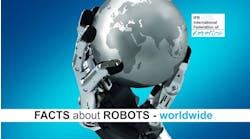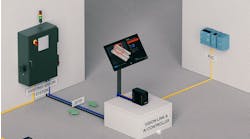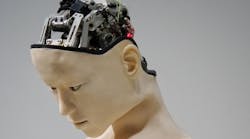Properly leveraged, artificial intelligence (AI) has the potential to empower manufacturers with data-based insights specific to their individualized operations. Beyond revolutionizing the industrial approach to maintenance, AI has the potential to impact generative design, enhanced robotic collaboration and improved market understanding.
As a recent ABI report shows, the market is steadily embracing AI’s potential. Specifically, the total installed base of AI-enabled devices in industrial manufacturing is expected to reach 15.4 million in 2024. As such, the demands for the deployment of AI in manufacturing have led to the emergence of startups that work on AI algorithms to increase and optimize production processes in the manufacturing setting other than machine vision-based solutions. These AI algorithms can discover patterns, recognize conditions, and provide early warnings and explanations on current operation status and abnormalities. ABI Research, a global tech market advisory firm, finds SparkCognition and Sight Machine to be the leaders in industrial AI focusing on production process optimization.
"AI is a promising horizontal technology, but by itself, it doesn't do anything for manufacturers until they have a product built for their industry that turns plant data into information AI can work on,” Sight Machine President and CEO Jon Sobel tells IndustryWeek. “We're gratified to see ABI recognize the value of a manufacturing-focused product platform. As all of these efforts move beyond pilots into multi-factory deployments, we're appreciative to see such rapidly accelerating progress for manufacturers."
ABI’s Industrial AI competitive assessment analyzed and ranked seven vendors on overall efficiency enhancement, namely Falkonry, FogHorn, Maana, Presenso, Sight Machine, SparkCognition, and Uptake. For this competitive assessment, innovation scores examined the technical capabilities of the vendor’s software and implementation scores focused on the vendor’s commercial ability to deliver their solution and integrate with existing solutions from the incumbents, such as GE, Siemens, ABB, and Bosch, across a variety of manufacturing verticals.
“While there are many players offering industrial AI solutions, ranging from cloud service providers to system integrators, this competitive assessment focuses on pure-play industrial AI software vendors. All seven vendors listed in this competitive assessment have a tight focus on developing AI software for overall efficiency enhancement in industrial and manufacturing applications,” explains Lian Jye Su, Principal Analyst at ABI Research. These vendors establish partnerships with various public cloud vendors, system integrators, chipset, and industrial equipment manufacturers, allowing their solutions to be deployed on device, gateways, and on-premise servers.
“SparkCognition and Sight Machine both exhibit strength in having cutting-edge automated machine learning capabilities and a large client base, with interoperable solutions that can co-exist with existing industrial and manufacturing software,” says Su. “At the moment, most AI solutions can collect data and perform semi-supervised machine learning to generate insights and recommendations. The rise of automated machine learning will free AI experts from the more mundane AI optimization tasks and allow them to explore new AI use cases.”
“A view of the whole process, all the way upstream, and all the way downstream allows manufacturers to escape the single-point solutions and consulting projects offered by most vendors,” says Sight Machine Chief Product Officer John Merrells. “Managers can track the efficiency and effectiveness of their plants, engineers can optimize for a mix of quality, availability, and performance, and operators are empowered to take action to meet their production targets.”
Both vendors are followed by Uptake, FogHorn, and Falkonry respectively. This group of players exhibits strength in a specific segment of the competitive assessment. As the leader in innovation, Falkonry offers great innovative solutions, particularly when it comes to cloud-to-edge data acquisition, where many competitors are only offering cloud-based solutions. On the other hand, Uptake is the leader in implementation, due to its strong presence in predictive maintenance across various industries, which is bound to translate well into client acquisition. However, Uptake’s solution is limited to the cloud, but its partnership with edge AI specialist FogHorn will enable both companies to create edge-to-cloud AI capabilities, making them formidable challengers in years to come.
“It is important to recognize the fact that manufacturers are facing enormous competition in building and training in-house data science teams for AI implementation. Most AI talents prefer to work with webscale giants or AI startups, making talent acquisition a challenging task for industrial manufacturers. As such, they are left with one viable option: partnering with pure-play industrial AI startups. Doing so will give them extra assistance and advice in deploying AI capabilities. Due to the invaluable skillset and intellectual property of these startups, they are often being acquired by large vendors and manufacturers, as shown in the recent acquisition of Presenso by SKF,” concludes Su.










